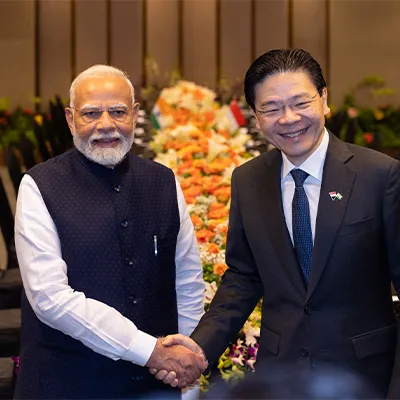SINGAPORE - The Government will be investing $150 million in research and development (R&D) of space capabilities applicable to key industrial sectors for Singapore and daily life, said Minister for Trade and Industry Gan Kim Yong on Wednesday (Feb 9).
The flagship Space Technology Development Programme (STDP), started by the Office for Space Technology and Industry (OSTIn) and the National Research Foundation, will fund researchers in Singapore.
This investment aims to encourage local space innovation for nationally important sectors, like aviation and maritime, and also everyday applications such as global positioning systems (GPS) that are crucial to ride-hailing services and parcel delivery tracking.
This will help Singapore maintain its position as a research and technology hub in emerging technologies and as an emerging hub for capital, talent and intellectual property, Mr Gan said.
He was speaking at the 14th Global Space and Technology Convention held at Sheraton Towers, which also had international participants attend remotely.
"Given the multidisciplinary nature of space technology, I encourage local researchers working in adjacent domains such as robotics, AI, material science and even urban solutions to explore if your technologies can be applied to space applications and vice versa," he added.
The first tranche of projects tapping this fund is in the process of being assessed, and an open grant call will be launched in the second half of this year.
Singapore will also focus on building international partnerships and continuing to nurture local space-tech firms as part of its space strategy, Mr Gan said.
National space office OSTIn, which was created in 2013, has been supporting Singaporean companies in developing internationally competitive capabilities.
Among them is SpeQtral, which will, with the help of the Government, launch a satellite into space to test a new secure communications technology that prevents third parties from stealing data transmitted over fibre optics.
OSTIn also signed an agreement with the European Space Agency last October to collaborate on space-tech applications and services in telecommunications and related fields. On Wednesday, it renewed a space-tech cooperation agreement with the French Space Agency that was first signed in 2015.
Such international partnerships build a pipeline for Singapore's space-tech firms to expand into more mature space industries abroad and tap more robust international experience.
AddValue Technologies, a local satellite communications company which supports maritime communications, said that Singapore firms stand to gain from such collaborations.
The company's senior vice-president of commercial and marketing Richard Lau said: "Such international collaborations bring together the expertise of respective countries' space technology firms and will create more opportunities for Singaporean start-ups and new companies to flourish."
The international space industry is forecast to reach US$1 trillion (S$1.3 trillion) in value by 2040.
"Here in Singapore, the space sector continues to stay vibrant, with more than 50 companies employing more than 1,800 professionals. These companies are critical enablers for other sectors - from aviation to maritime," noted Mr Gan.
ST Engineering, which launched the first Singapore-made commercial earth observation satellite in 2015, is now a market leader that supplies satellite communications systems to global customers such as American telco Verizon.
Singapore Space & Technology Ltd (SSTL), a non-government organisation that runs a space accelerator programme with Enterprise Singapore, signed a memorandum of understanding (MOU) on Wednesday to form a trade corridor with the United Kingdom.
This will facilitate the partnering of Singapore and UK space start-ups for resources like investment, expertise and even to trial their products in those markets.
British High Commissioner to Singapore Kara Owen, who signed the MOU on behalf of the UK, said: "International partnership is one of the four important pillars of (the UK's space strategy) and so it makes sense to work closely with Singapore."
This is one of the three MOUs that SSTL has inked with international and domestic partners to promote the use of local space technology on Wednesday.
Ms Lynette Tan, CEO of SSTL, said: "These MOUs are significant because they touch on strategic pillars that will help Asia take an important share of that anticipated US$1 trillion industry potential."
Source: The Straits Times © SPH Media Limited. Permission required for reproduction.







